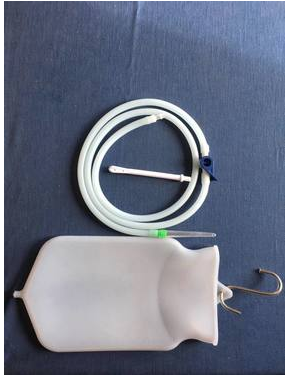Research
Coffee Enemas
Clinical Study
Volume 2013 |Article ID 147238 | 7 pages | https://doi.org/10.1155/2013/147238
Pharmacokinetics of Caffeine following a Single Administration of Coffee Enema versus Oral Coffee Consumption in Healthy Male Subjects
Supanimit Teekachunhatean 1,2 Nisanuch Tosri,3 Noppamas Rojanasthien,1 Somdet Srichairatanakool,4 and Chaichan Sangdee1
Academic Editor: T. W. Stone
Received 08 Jan 2013
Accepted 30 Jan 2013
Published 04 Mar 2013
Abstract
The objective of this study was to determine the pharmacokinetics of caffeine after single administration of a coffee enema versus coffee consumed orally in healthy male subjects. The study design was an open-label, randomized two-phase crossover study. Eleven healthy subjects were randomly assigned either to receive 500 mL of coffee enema for 10 minutes or to consume 180 mL of ready-to-drink coffee beverage. After a washout period of at least 10 days, all the subjects were switched to receive the alternate coffee procedure. Blood samples were collected immediately before and at specific time points until 12 hours after coffee administration in each phase. The mean caffeine content in both the coffee solution prepared for the coffee enema and the ready-to-drink coffee beverage was not statistically different. The C-max and AUC of caffeine obtained from the coffee enema were about 3.5 times significantly less than those of the coffee consumed orally, despite having slightly but statistically faster. The t1/2 of caffeine obtained following both coffee procedures did not statistically differ. In summary, the relative bioavailability of caffeine obtained from the coffee enema was about 3.5 times significantly less than those of the coffee consumed orally.
Extracts from the study:
Although our previous study has demonstrated that single or multiple doses of coffee enema do not produce beneficial effects with respect to an enhancement of serum glutathione levels and trolox equivalent antioxidant capacity or a decrease in serum malondialdehyde concentrations in the same population reported here [9], documented evidence exists that it might be associated with considerable potential risks. It is worth noting that such procedure should be performed by trained and skillful personnel using appropriate equipment in subjects or patients without contraindication (i.e., colorectal cancer, recent bowel surgery, colostomy, gut obstruction, hemorrhoids, diverticulitis, Crohn’s disease, ulcerative colitis, irritable bowel syndrome, etc.).
The coffee used for oral consumption in this study was the commercially available ready-to-drink coffee beverage (instant coffee with milk and sugar), Red Bull Coffee manufactured by TC Pharmaceutical Industry Co., Ltd.
Full article available:
https://www.hindawi.com/journals/isrn/2013/147238/
Volume 2013 |Article ID 147238 | 7 pages | https://doi.org/10.1155/2013/147238
Pharmacokinetics of Caffeine following a Single Administration of Coffee Enema versus Oral Coffee Consumption in Healthy Male Subjects
Supanimit Teekachunhatean 1,2 Nisanuch Tosri,3 Noppamas Rojanasthien,1 Somdet Srichairatanakool,4 and Chaichan Sangdee1
Academic Editor: T. W. Stone
Received 08 Jan 2013
Accepted 30 Jan 2013
Published 04 Mar 2013
Abstract
The objective of this study was to determine the pharmacokinetics of caffeine after single administration of a coffee enema versus coffee consumed orally in healthy male subjects. The study design was an open-label, randomized two-phase crossover study. Eleven healthy subjects were randomly assigned either to receive 500 mL of coffee enema for 10 minutes or to consume 180 mL of ready-to-drink coffee beverage. After a washout period of at least 10 days, all the subjects were switched to receive the alternate coffee procedure. Blood samples were collected immediately before and at specific time points until 12 hours after coffee administration in each phase. The mean caffeine content in both the coffee solution prepared for the coffee enema and the ready-to-drink coffee beverage was not statistically different. The C-max and AUC of caffeine obtained from the coffee enema were about 3.5 times significantly less than those of the coffee consumed orally, despite having slightly but statistically faster. The t1/2 of caffeine obtained following both coffee procedures did not statistically differ. In summary, the relative bioavailability of caffeine obtained from the coffee enema was about 3.5 times significantly less than those of the coffee consumed orally.
Extracts from the study:
Although our previous study has demonstrated that single or multiple doses of coffee enema do not produce beneficial effects with respect to an enhancement of serum glutathione levels and trolox equivalent antioxidant capacity or a decrease in serum malondialdehyde concentrations in the same population reported here [9], documented evidence exists that it might be associated with considerable potential risks. It is worth noting that such procedure should be performed by trained and skillful personnel using appropriate equipment in subjects or patients without contraindication (i.e., colorectal cancer, recent bowel surgery, colostomy, gut obstruction, hemorrhoids, diverticulitis, Crohn’s disease, ulcerative colitis, irritable bowel syndrome, etc.).
The coffee used for oral consumption in this study was the commercially available ready-to-drink coffee beverage (instant coffee with milk and sugar), Red Bull Coffee manufactured by TC Pharmaceutical Industry Co., Ltd.
Full article available:
https://www.hindawi.com/journals/isrn/2013/147238/
